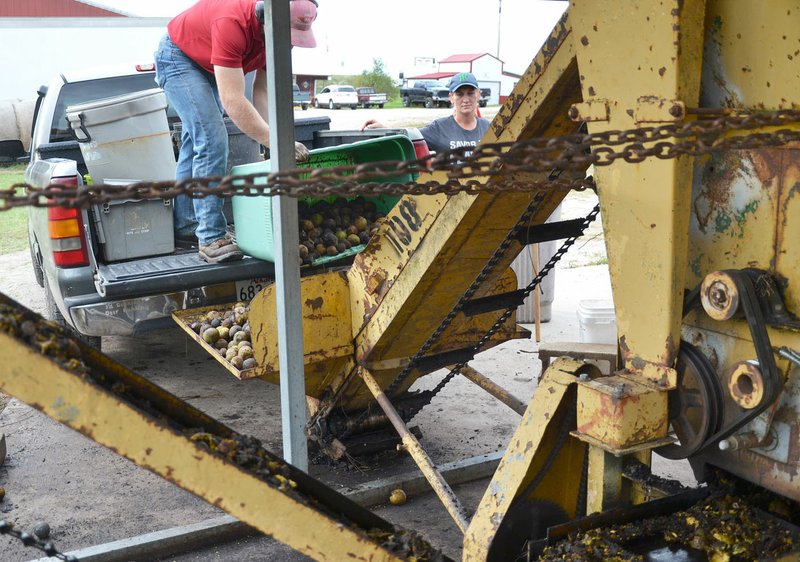GARFIELD -- The black gold of the Ozarks isn't oil. It grows on trees and is often overlooked, stepped on and considered a nuisance by some.
Black walnuts grow abundantly in the Ozarks.
Hammons Products Co.
Buyers include:
Flying RF Feed & Farm Supply
16601 U.S. Hwy. 62
Garfield AR 72732
Stanley Walnut
28054 Hickory St.
Seligman, MO
Longview Mill
16741 E. Mo. Hwy. 76
Longview MO 64861
James Link
Junctino of 49 & 59 Hwy.
Anderson MO
***
Locations listed on Hammon’s web site.
Flying RF Feed
16601 East U.S. Hwy. 62
Garfield AR
Phone: 479-359-2211
8 a.m. - 6 p.m. Monday - Friday
8 a.m. - 4 p.m. Saturday
Taking walnuts until the end of October
Paying: $15/100 lbs. hulled
Or Store credit of $16.50/100 lbs. hulled for same day transactions
The green and black hulls of black walnuts found throughout Northwest Arkansas and Southwest Missouri are a boon to local residents looking for a little extra cash. It's been a bumper crop this year, said Brad Fortner, owner of Flying RF Feed, a local buyer for Hammons Products Co., a company based in Stockton, Mo.
"We've already taken in over 15,000 pounds in the first four days," Fortner said.
Fortner started buying black walnuts in 2015 when he learned that longtime buyer Webb Feed and Seed in Pea Ridge wasn't going to buy them anymore. Owner Fred McKinney had died and the heirs didn't want to continue that part of the business.
"We'd heard they were going to stop hauling walnuts ... he wasn't going to mess with it.
"That's what really started the talks on the purchase," Fortner said, referring to his purchase of Webb Feed and Seed.
For decades, McKinney bought walnuts and sold them to Hammons. He was honored as having been the oldest procurement station of black walnuts for Hammons.
The first year, Fortner replicated McKinney's pattern, bagging walnuts and putting them on pallets and in a truck. But, he said that was labor intensive and time consuming and he had problems with squirrels getting into the nuts waiting for shipment to Hammons.
"All of the hullers belong to Hammons," Fortner said, adding that they service the machines. "We just keep it in good condition to use.
"The last couple of years, we've worked hard at refining our process."
"This year, we decided to make it worthwhile and started doing it in bulk instead of in bags," Fortner said. The walnuts are dumped into tubs, weighed on a platform scale and poured into a front end loader to be poured into a bulk trailer.
"We've already done over half as much as we did our first year in just the first four days," he grinned.
Outside, beneath a roof, a customer stands beside her truck as store manager Cole Deckard and employee Preston Oldebeken work together on the walnuts. Both wear protective ear gear as the machine's rumbles and rattles are loud.
As they work, the walnuts -- which are still covered in their green-turning-black hulls -- move from the bin by a conveyor belt that dumps them into the heart of the loudly rumbling machine. Conversation ceases as the noise drowns out everything else. Inside, chains beat off the hulls. From one part of the rumbling monster, the dark hard cores spill out; from another, the mush of hulls. Mountains of the green-black hulls have built up on the ground -- hulls that will be spread on the grounds around the feed store.
After hours, maybe days of back-breaking work -- picking up the fallen nuts, loading them into baskets, sacks, barrels, wheelbarrows, whatever's handy to collect them, and then dumping them into trucks -- the weight is what matters. More weight means more dollars into the hands stained black by the rotting hulls.
Some area residents say the walnuts damage their lawn mowers and they welcome someone else to pick them up.
Fortner keeps a list of people who have walnuts and want someone else to pick them up and people willing to pick them up.
"We like connecting them," he said. "We have some people who will bring in a load every day. They relay get after it.
"Hopefully we've made it where it's easy for them. We unload them," he said.
The mounds of hulls are allowed to compost then are spread on the ground. It's a low grade fertilizer, Fortner said, adding that many people use it for compost along fence rows to keep down the weeks.
"It's a service to everybody," he said. "We weren't sure what we were getting into."
Buying the walnuts opens avenues to other business as well as providing a source of income for a lot of people, Fortner said.
"We enjoy seeing new faces and bringing people in... some people just want us to hull their walnuts," he said.
Hammons buys about 30 million pounds of walnuts from 13 states.
"Basically, they're the only producer in the world for Eastern Black Walnuts," Fortner said. There are many uses for walnuts in addition to eating the meat.
The meats are used for Christmas candies, brownies and many other recipes.
The hulls are used for replacement for sandblasting and media blasting. Trappers use the walnuts to cover scent on tracks. The hulls can be used for stain. There are many byproducts, he said.
Business on 10/18/2017
